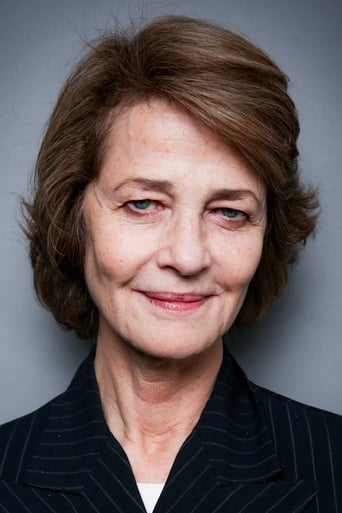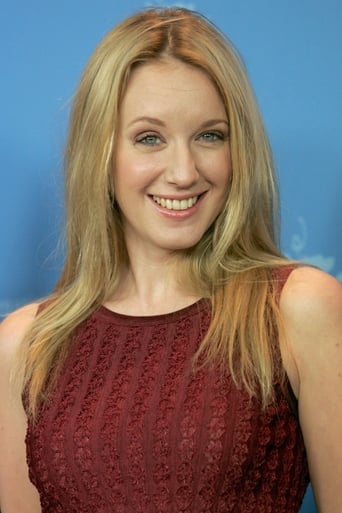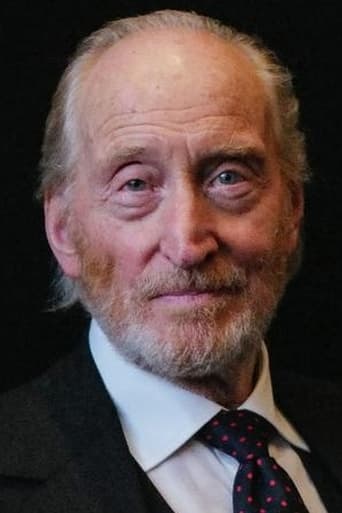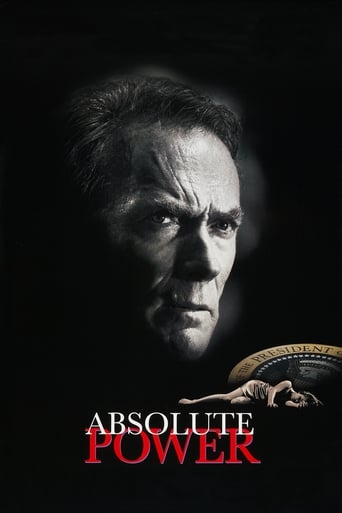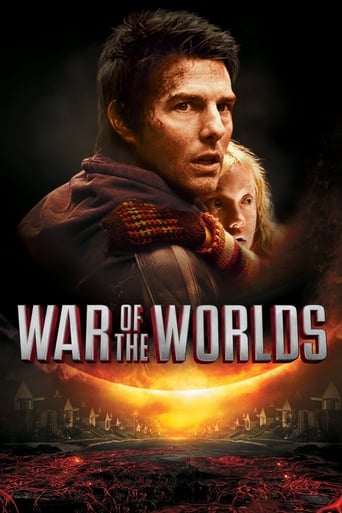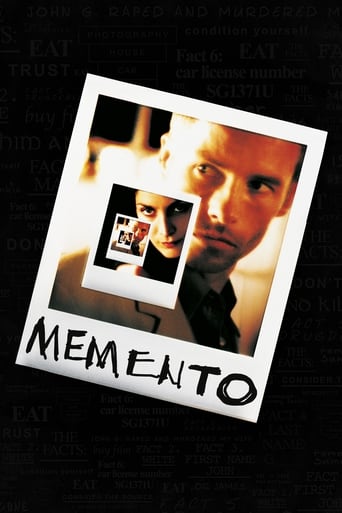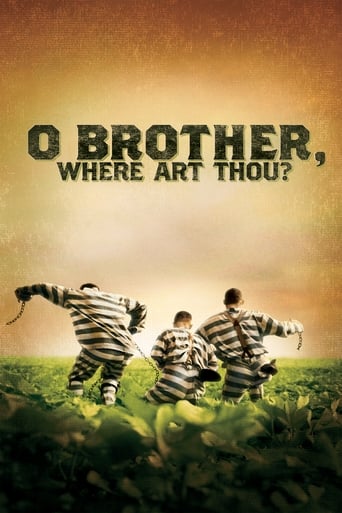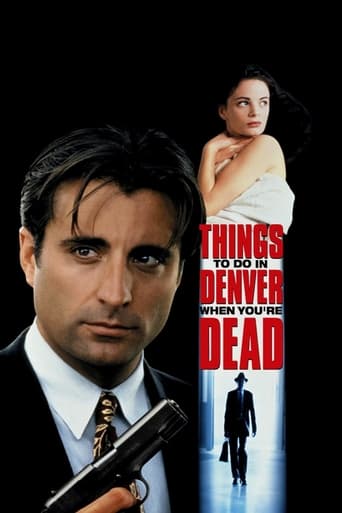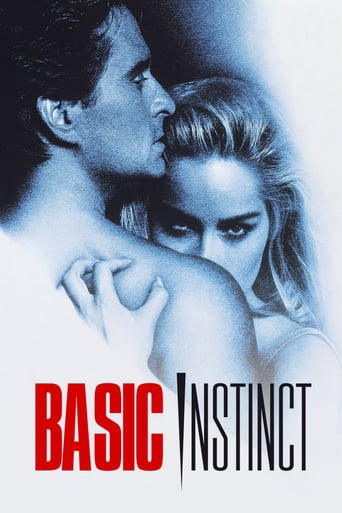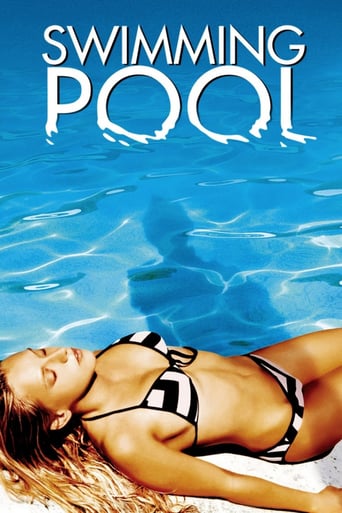

Swimming Pool (2003)
A British crime novelist travels to her publisher's upmarket summer house in Southern France to seek solitude in order to work on her next book. However, the unexpected arrival of the publisher's daughter induces complications and a subsequent crime.
Watch Trailer
Cast


Similar titles
Reviews
Sarah is a British author of mystery/crime novels. She's also a miserable despicable woman who isn't satisfied until everyone around her is miserable too. Her editor is expecting a new work of hers so he sends her to his vacation house in France to get inspiration. He lets her know that his daughter may stop by.In France Sarah sort of regains her humanity. She meets the older care-taker of the place, a server at a cafe/restaurant she goes to every day. Eventually the editor's daughter does show up. Julie is young, wild, free-spirited, brings different men home and has loud sex with them to the annoyance of Sarah who claims to need peace and quiet to write. That causes strife between the two. Julie lives life to the fullest, swims, sunbathes, eats good food. Sarah eats every day the same junk, thinks too highly of herself to swim. Sarah goes through Julie's stuff, reads her diary, finds some things that interest her, and now is more open to her. They start getting along. It turns out that Julie is the inspiration Sarah needs not just for her writing but for life. Julie discovers that Sarah went through her stuff, so she goes through her stuff. Now things take a turn for the worse as they are both suspicious of each other.One night Julie brings the server home and gets Sarah to dance with him. Later though Sarah out of spite interrupts a sex act between Julie and the guy, things get a bit nonsensical. Next day Sarah discovers that the server and/or Julie have vanished. A crime has taken place and Sarah, the expert in crimes helps to cover it up. Sarah becomes interested in knowing more about who Julie is and at the end she and we make a surprising discovery.While I do appreciate movies about writing and inspiration, Swimming Pool follows the formula of making the author a crime mystery author who apparently mixes up reality and fiction. We've seen that before. The movie also fails to some extent because it doesn't really get the audience to care enough to pay close attention from the beginning given that it will turn into some puzzle for the audience. So I guess one can say the surprise succeeded but at the same time the setup is so dull that I wasn't paying all that much attention to what was going on or the details. Reading the various interpretations, it doesn't look like there isn't any one answer, which also makes it less interesting for me and shows that paying full attention would not have been any more rewarding. With a different cast and a less stiffer direction perhaps Swimming Pool would have been more effective.
This movie is a real precious piece of art ,and the acting done by "Charlotte Rampling" deserves my thanks and appreciation and admiration too, i didn't think that it's going to amaze me with such twisted plot , this movie is in my ten most confusing ends movies , you will not be able to find an appropriate,logical interpretation for the story that easy , every explanation will refuted by another explanation from another viewer,therefor i think this film plot was accurately and purposely done to confound the viewer/mind-blow them so every one has to make interpretation that fits them .
The last 20 or so minutes of this movie was completely absurd!!! Here are some things I found myself baffled by while watching: 1. Of course someone (especially the gardener) is going to notice a freshly dug grave! Anyone who has ever watched an episode of CSI would know that, let alone someone who we're supposed to believe is a detective crime writer.2. "Sarah" awkwardly presents her naked body to Marcel so that he won't spill the beans, and we're supposed to believe this man who just appeared totally horrified by his discovery takes her up? I don't know, maybe it's because I'm female and/or not an old man who hasn't got any in years so I can't imagine that. What they *should* have done is made Sarah go psycho and kill Marcel! I could totally picture her doing it. And anyway, she's been all over town asking questions about his disappearance, won't somebody get suspicious?3. It suddenly turns very detective crime novel-y. This is not something I would object to, but it came completely out of nowhere. 4. The book within a book within a book crap really did not work. 5. I can think of a million different endings for this book that would have made a lot more sense and been better than what's presented to the unfortunate viewer. For example, Julie's character was quite believable, as was the murder, so it's unfortunate to have her psychosis not explored at all. I honestly believe it was just extremely sloppy writing, with no thought put to making it cohesive and coherent in any way. They took all this time working on the characters and building the intrigue, then just threw a bunch of ideas together. I did like the Sarah-Julie dynamic that developed very much. And also the little touches, like repeated motifs and symbols and Marcel's creeeepy daughter. This attention to detail is what makes the ending so baffling.
(Spoilers!) This film is not for those who want everything spelled out for them, since it is open to many interpretations. I add mine here.The movie gave me some insight into how fiction writers create their work, since it delves into the things that spark an author's imagination. The writer in this movie is Sara Morton (Charlotte Rampling), a popular British author of crime fiction. When we first meet her, Sara is a bit burned out and when her publisher offers her his country house in the south of France as a temporary retreat to get her back on track, Sara accepts.We get to know some things about Sara as we see her settle into the house in France. She dresses rather plainly and is quite reserved. Even though she speaks French well, she is not very adventuresome, sticking close to the house with occasional visits to the local village. She seems to be immune to the French obsession with food, settling for fruit and yogurt. She hopes for a more intimate relation with her married publisher, John, and is disappointed when he reneges on coming to join her for a weekend on occasion. Nearing sixty, Sara seems sexually frustrated and very much alone.The movie moves into a different gear when Sara starts to conceive of a storyline for her next novel that involves an imagined visit from Julie, a fictitious version of John's daughter. For many reasons I think that there never was a real Julie. For one thing, when still in London in John's office, Sara asks him, "Would you come and visit me?," John answers, "Well, I have got my daughter." He didn't say, "I have got my younger daughter," or "I have got one of my daughters," but, "I have got my daughter." This indicated to me that John indeed had only one daughter. Sara never talks to John directly about Julie. When Julie is seen talking to her father and passes the phone to Sara, John is not on the line, and when Sara calls back, he is out of the office. If John's French daughter frequented his country home, wouldn't John tell her that Sara would be staying there? Also, the ending makes sense if there was never a Julie, since Sara's waving goodbye is seen as waving goodbye to her imagining of John's daughter for her fiction as well as her imagining of John's real daughter, whom we see at the end she has never met. Indeed I think John's comment, "I have got my daughter," was probably the initial spark for Sara's vision of an attempt at a novel.Most of what we see is Sara's conception of her novel. It is interesting how certain real events weave themselves into her fiction. Franck, the waiter at a local café becomes a character in the fiction, fantasized as one of Julie's lovers, but also fantasized by Sara as a lover for herself. Engaging to see how fiction writers may actually become involved with their imagined characters in a non-trivial way. Sara identifies with her imagining of Julie's mother to the point of wearing a dress she ascribes to her. Perhaps like actors, authors can temporarily take on the identity of their characters.Sara's fiction moves on as a rather unbelievable crime story that has Julie killing Franck and covering up the murder. At this point I think that Sara became disenchanted with what she was writing as being just another crime story; she had indicated earlier in the movie that she was tired of writing such stories. And this story seemed particularly uninspired and unbelievable (I think I have never seen a more artificial looking rock than the one Julie uses for the murder). I think that Sara, realizing the inanity of where her story was headed, then abandoned that whole effort in favor of writing the novel that Julie's mother supposedly had written. At one point Sara is sharing a meal with Julie and, after asking Julie a lot of questions, Julie remarks that Sara is showing a little too much interest in her life. Sara then says, "I am not so much interested in you as I am in your mother." I think that signaled the turning point when Sara started thinking about jettisoning the Julie story in favor of writing the romantic novel that Julie's mother supposedly had written.As to what Julie represented for Sara is anybody's guess I think. Was she an imagining of what Sara would like to have been as a young woman? Was Julie realized as part autobiography? What is real and what is imagined in a work of fiction seems to be a tricky thing. Perhaps a good deal of fiction is an expression of wish fulfillment on the part of the author.There are many elements in the movie whose interpretation is totally up for grabs. For example, what is the meaning of the egg that we see in several scenes that is constructed of several interlocking pieces? Is it a puzzle to be cracked, like this story? Is it the symbol of a new beginning for Sara? Or is it simply an ornamental knickknack? And what is the significance of the dark red inflatable mattress? How does the caretaker fit into the puzzle? Ozon and his screenwriter Emmanuèle Bernheim have presented the audience with a skeletal story that can be fleshed out in a multitude of ways.Whatever you think of the story, the movie is crisply filmed. We get a peek into what it might be like to live in a secluded area in southern France. Charlotte Rampling is in good form; it is a treat to see that she is getting good roles as she ages. Ludivine Sagnier is remarkably comfortable playing the voluptuous Julie and Charles Dance has a good turn as Sara's publisher. The score is suitably low key, but not without effect.


